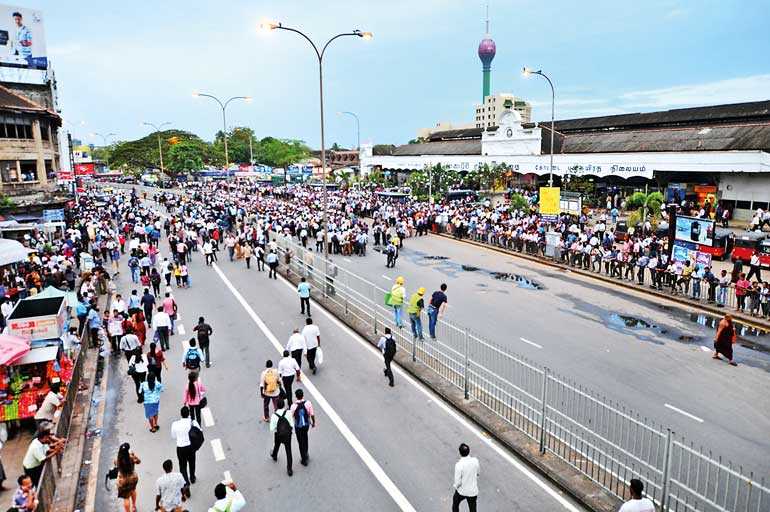Wednesday Feb 18, 2026
Wednesday Feb 18, 2026
Thursday, 9 August 2018 00:08 - - {{hitsCtrl.values.hits}}

Hundreds of commuters protest in front of the Fort Railway Station after unions launch unannounced strike - Pic by Shehan Gunasekera
Hundreds of train commuters yesterday clashed with railway trade unions after a flash strike was staged by the latter with no notice, prompting the Government to deploy the Special Task Force (STF) to protect the station.
Commuters, who flocked to Fort Railway Station last afternoon, battled with railway workers, breaking windows and causing damage to public property. The media, which arrived at the Station to cover the clash, were also driven away by angry commuters.
Responding to the unannounced strike, the Transport Ministry scrambled to provide alternative transport to thousands of stranded commuters and announced that season passes would be valid for travel in Ceylon Transport Board (CTB) buses. The Ministry has also allowed private transport buses to ply any route till the train strike ends, irrespective of their route permits, in an effort to increase transportation options to the public, according to the Government Information Department.
Given that the strike was called in the middle of Advanced Level exams, a special bus service operated by the military would also be started from today to provide transport to students. The Railway Department also requested all retired engine drivers to report to work by 6 a.m. today, and the Transport Ministry cancelled leave for all CTB drivers to deal with increased demand due to the train strike.
Striking unions were initially expected to have a meeting with Finance Minister Mangala Samaraweera last afternoon, according to reports. But talks failed to materialise after Samaraweera had told unions to call off their strike before coming for discussions.
The railway unions are demanding a salary increase, which the Government has rejected as it would result in 24 other public sector workers being eligible for the same salary increase. The Government, under its strict fiscal consolidation program, has attempted to control public expenditure and keep the budget deficit in check. A salary increase to public servants would also spillover into higher levels of inflation that would challenge macroeconomic stability, experts said.